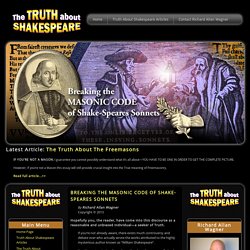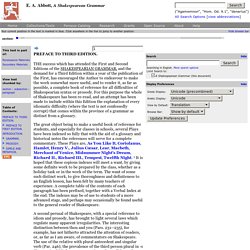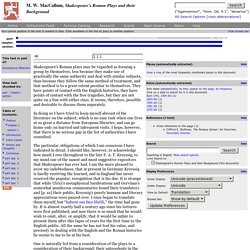

Paterson, Ronan. Shakespeare's language and the contemporary cinema audience. Speaking the bright and beautiful English of Shakespeare, Ben Crystal. Linguist David Crystal on Shakespeare, Downton Abbey and Babel magazine. David Crystal on English Idioms by Shakespeare. How to Talk Like Shakespeare. David crystal and shakespeare.
Shakespeare renaissance language. The Sonnets by William Shakespeare on Vimeo. Why Shakespeare loved iambic pentameter - David T. Freeman and Gregory Taylor. While interesting to explore in his plays, the idea of Shakespeare as a poet isn’t new.

He wrote many poems. Most famously, he penned 154 sonnets that are often as studied and celebrated as his plays. His sonnets feature a specific format that uses iambic pentameter to reflect great meaning and emotion in a short burst of verse. If it’s the words themselves that grab you, take a plunge down the rabbit hole of Open Source Shakespeare: a beautiful marriage of the bard and technology that allows you to search every poem and play Shakespeare ever wrote for individual words and phrases. Just how many times does the world “blood” show up in Macbeth? You’ve seen some of the similarities between Shakespeare’s meter and music.
If all of this wordplay makes you want to get up on your feet and speak the words, you should research the English Speaking Union’s National Shakespeare Competition – an annual recitation competition featuring some of Shakespeare’s greatest speeches. Breaking the Masonic Code of SHAKE-SPEARES SONNETS. Breaking the Masonic Code of SHAKE-SPEARES SONNETS By Richard Allan WagnerCopyright © 2013 Hopefully you, the reader, have come into this discourse as a reasonable and unbiased individual—a seeker of Truth.

If you’re not already aware, there exists much controversy and debate over who actually wrote the works attributed to the highly mysterious author known as “William Shakespeare”. Yes, the vast majority of people on the planet have generally (and unknowingly) accepted the premise that a man named “William Shakespeare” (of Stratford) wrote the literary works attributed to him. The problem rests with the fact that there is scarce evidence of the Stratford man’s existence—but more importantly, there is NO TANGIBLE EVIDENCE the “Stratford man” wrote the literary body of work for which he is given credit—in fact, there is a mountain of hard, legitimate evidence to the contrary!
The LOST SECRET of William Shakespeare (www.TheLostSecretofWilliamShakespeare.com) Johnson states: “Mr. The “E. E. A. Abbott, A Shakespearean Grammar, PREFACE TO THIRD EDITION. THE success which has attended the First and Second Editions of the SHAKESPEARIAN GRAMMAR, and the demand for a Third Edition within a year of the publication of the First, has encouraged the Author to endeavour to make the work somewhat more useful, and to render it, as far as possible, a complete book of reference for all difficulties of Shakespearian syntax or prosody.

For this purpose the whole of Shakespeare has been re-read, and an attempt has been made to include within this Edition the explanation of every idiomatic difficulty (where the text is not confessedly corrupt) that comes within the province of a grammar as distinct from a glossary. The great object being to make a useful book of reference for students, and especially for classes in schools, several Plays have been indexed so fully that with the aid of a glossary and historical notes the references will serve for a complete commentary. E. M. W. MacCallum, Shakespeare's Roman Plays and their Background, Preface, chapter 1, section 1. Shakespeare's Roman plays may be regarded as forming a group by themselves, less because they make use of practically the same authority and deal with similar subjects, than because they follow the same method of treatment, and that method is to a great extent peculiar to themselves.

They have points of contact with the English histories, they have points of contact with the free tragedies, but they are not quite on a line with either class. It seems, therefore, possible and desirable to discuss them separately. In doing so I have tried to keep myself abreast of the literature on the subject; which is no easy task when one lives at so great a distance from European libraries, and can go home only on hurried and infrequent visits. I hope, however, that there is no serious gap in the list of authorities I have consulted. The particular obligations of which I am conscious I have indicated in detail. The essay on Amyot needs less apology. Of North, even after Mr. Virtual Tour.